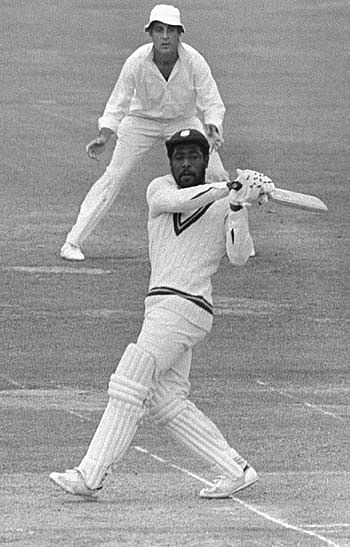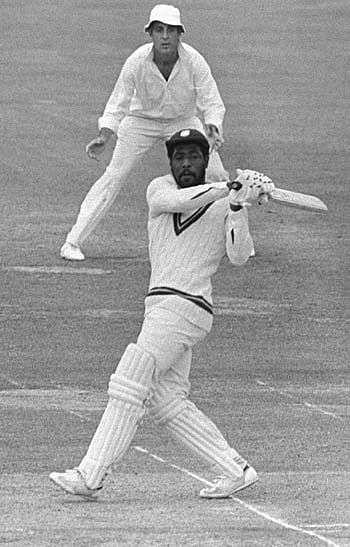
Top 5 World Cup specialists: Part 2 - Batsmen
The following slideshow is the Part 2 of a dual series dedicated to identifying World Cup (WC) specialists, with the current instalment focusing on batsmen who have upped the ante when their country needed it the most. You can view Part 1 here. The selection is made on the basis of a quantitative methodology, the key criteria of which are as follows:Minimum qualification: 1000 runs in WCsScore: This has been calculated by multiplying the two essential parameters a batsman is assessed upon – Average and Strike Rate (SR). For example, a batsman with an average of 50 and an SR of 100 will have a score of 50 x 100 = 5000. As with most statistics associated with batting, higher the score, better is the performance.Greater the difference between their career scores and the WC scores, the higher will the batsman feature on this list.To give an indication of the batsmen knocking on the doors of this list, had the qualification criteria been reduced to 900, two Aussie greats – Steve Waugh and Matthew Hayden – would have broken their way in, and the list would have been topped by an unheralded New Zealander, Scott Styris; with Jacob Oram featuring prominently in the bowling compilation, this perhaps explains why the Kiwis have been so consistent in WCs.
#5 Viv Richards

Arguably the most feared batsman of his time, Sir Vivian Richards, after a forgettable 1975 WC, one in which he made his ODI debut as well, dominated the next three between 1979-87; he finished with an aggregate of 1013 runs at a batting average of 63.31 (surprisingly, the only other batsman with an average above 60 among top-25 run-scorers in the 50-over WC is Rahul Dravid) and an SR of 85.05 and would have been placed much higher on this list but for his equally good performances outside of the WC.
The Antiguan’s first dominating innings in a WC could not have come at a better time - during the final of the 1979 edition, against hosts England. After West Indies were put into bat in bowler-friendly conditions and pressed on to the back-foot after the relatively cheap dismissals of the celebrated opening duo of Desmond Haynes and Gordon Greenidge, Richards strode out to the middle with his trademark swagger and pulverized the English attack into submission with an unbeaten 138, to help post a strong total of 286 in 60 overs, one which the famed Caribbean pace battery defended with ease to lift the biggest title in limited overs cricket for the second successive time.
The ‘King’ was at his most devastating in the 1983 WC, especially towards the business end of the tournament: scores in his three innings leading into the final read: 119(v India), 95*(v Australia) and 80*(v Pakistan, in the semi-finals). Halfway into the final, against India, at Lord’s, the score was eerily similar to what their sub-continental neighbours had put up: India were 183 all out as compared to Pakistan’s 184/8. West Indies’ chase also began in a similar manner, with both openers back in the hut with not many runs on the board.
On the previous occasion, Richards’ 80* saw the Caribbean team romp home to an 8-wicket victory, and he looked set to repeat the show, having bludgeoned 33 off just 27 balls, with seven boundaries. When he mistimed a short-arm pull off Madan Lal – such was the power of the man that even the miscue went miles into the air, the ball appeared destined to crash into the mid-wicket boundary after a couple of bounces, but Indian skipper Kapil Dev, in a supreme display of elegant athleticism, sprinted several yards from his position at mid-on and held on to the over-the-shoulder catch to bring about the moment acknowledged by many, including Cricinfo, as the turning point of the match.
The remaining West Indian batsmen, except Jeff Dujon and Malcom Marshall who put up a brief resistance, collapsed in the face of incisive medium-pace bowling, to allow India to lay their hands on the coveted trophy for the first time.
Richards was equally disdainful during the 1987 WC – his final appearance on the biggest stage, aggregating 391 runs, which included his highest score of 181, in a WC, against a hapless Sri Lankan bowling attack. He followed it up with a half-century against England and two more against Pakistan, facing a pace attack that comprised Imran Khan at the peak of his skills and a tearaway quick Wasim Akram.
While the Caribbean batting line-up continued to be star-studded, their famed pace battery was visibly depleted, with only Courtney Walsh and Patrick Patterson making an impact. It was a disappointing outing for their third seamer Winston Benjamin, and, with Curtly Ambrose’s international debut still a few months away, the Caribbean attack failed to invoke the fear they were famed for, and their earlier-than-expected exit probably marked the beginning of the end of the dominance of West Indian cricket on the international stage.
| Matches | Runs | Average | SR | Score | Score Differential | |
| Overall | 187 | 6721 | 47.00 | 90.20 | 4239.4 | 1145.1 |
| WC | 23 | 1013 | 63.31 | 85.05 | 5384.5 |